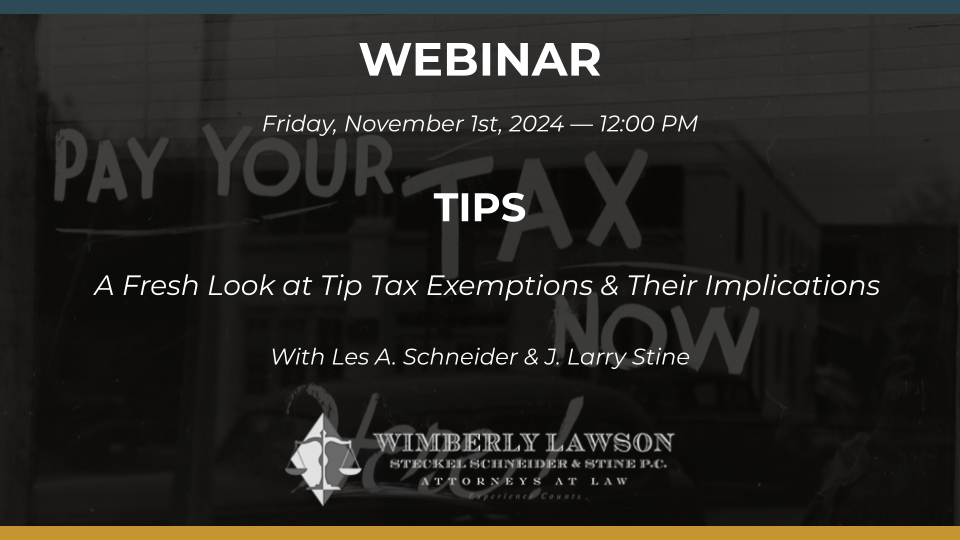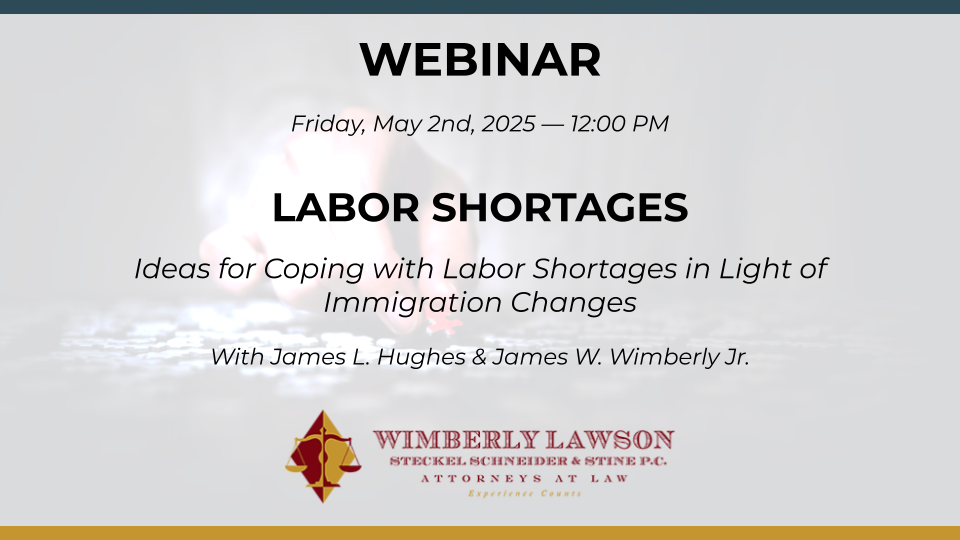
Prevent Court Cases & Avoid Class Actions – Pros & Cons of Arbitration Agreements in Company Policies
Did you know that the ten highest-grossing wage-and-hour settlements in 2022 were worth more than $574 million combined? Similarly, the ten highest settlements in class employment discrimination cases in 2022 total $597 million. At the same time, defense attorneys complain about “runaway juries” and “nuclear verdicts.”
What if there was a device by which adding a provision to an employment application could legally stop all class and collective actions, keep claims out of court, and avoid juries entirely? There is, it is called an individual arbitration agreement, which can be part of a job application. This webinar will examine the pros and cons of using individual arbitration agreements.
Presented by James W. Wimberly, James L Hughes & Sarah M. Kessler.


Watch Webinar Presentation
Webinar Transcript
James W. Wimberly (00:00):
Okay. Jim Wimberly here, and I'll, I'm gonna introduce you to a second attorney and he's gonna introduce you to the third attorney. But you were enticed into this program on my suggestion that there are ways to avoid court cases, jury trials, class actions, collective actions, and it all sounds very wonderful. And it is there are some downsides. There are pros and cons, and that's the main topic of the program today. But let me start by introducing Jim Hughes, who's gonna give you the history and background of why we can get these benefits from using individual employment agreements. Jim,
James L Hughes (00:51):
Thank you. My name is Jim Hughes, and to my right is our newest attorney in addition to the firm, Sarah Kessler. Yep. Sarah, could you give a little bit about your background?
Sarah M. Kessler (01:03):
Sure. I have an engineering degree from NC State and Raleigh, and then I went to the University of Georgia for law school. I've worked in a plant in quality control in textile manufacturing and done some intellectual property work. And now I'm
James L Hughes (01:18):
Here. And we're glad you've joined us. We wanna welcome you to our webinar today on class actions and how to use in individual arbitration agreements to avoid class and collective actions. As you may have seen in our announcement in 2022, there were 10 wage hour settlements. The totaled 574 million combined. There were also 10 class employment discrimination cases in 2022 that settled for a total of 597 million. And you have a defense attorneys who complain about runaway juries and nuclear verdicts. So today we wanna talk about how to stop class and collective actions, how to keep claims out of court, and how to avoid juries. Now may be appropriate to define some terms so that everyone is working from a common ground. First, we talk about arbitration. Arbitration is a system of resolving disputes where the two parties in the dispute submit their evidence in their arguments to person called an arbitrator. It's le it's a much less formal setting than being in a courtroom. You usually have an arbitrator who's experienced in the subject matter of the dispute. For example, if it's an employment discrimination dispute, that arbitrator would have employment discrimination experience. If it's a wage hour dispute, the arbitrator would have wage hour experience.
James L Hughes (03:16):
How do you get to arbitration? Well, you have to have an arbitration agreement, and that arbitration agreement is important in establishing the scope of what the arbitrator can consider in the arbitration. The arbitration agreement can be a, a part of your employee enrollment process where the employee signs off and agrees to submit any disputes to binding arbitration. It, and that's u usually the best way to handle it. Class actions class actions are big cases. They usually start where a few plaintiffs seek to go to court to represent hundreds or even thousands of plaintiffs. Most of us have been involved in some class action in our lives. For example Equifax had a data breach a few days ago that affected, I'm sorry, a few years ago that affected millions of people and there was a big class action settlement. And among millions of people, a across the country were participants in that settlement class actions are subject to some special rules in the federal rules and in state rules that define the requirements for a class action to proceed. And we're not going to get into the nitty gritty of that today. But just to let you know that it's not always easy to bring a class action. But if the plaintiffs are successful in bringing a class action, it can be a very expensive process that you want to avoid.
James L Hughes (05:16):
Class actions are usually handled in court with a judge, sometimes with a jury, depending on the nature of the litigation. And one way to avoid class actions is in your arbitration agreement. To have a class action waiver, a class action waiver means that the employee is agreeing not to bring his claim as part of a class action, but to resolve that claim in an individual arbitration between the employer and the employee. You've heard us talk about collective actions. Collective actions are usually brought under the wage and our laws, and those are opt-in type actions where many employees have to agree to participate in the collective action. It is similar to a class action in that it can, a collective action can involve many employees, but it's dissimilar in that in a class action you have to opt out and a collective action the employees have to opt in. You can also have a collective action waiver in your arbitration agreement, which means that the employee agrees to bring any wage, our claim on an individual basis that would be submitted to an arbitrator.
James L Hughes (06:55):
Now, why do we suggest or even consider arbitration agreements? Well, from the information that's publicly available, most employers have moved to some form of mandatory arbitration. Starting about 20 years ago arbitration became a, a big thing for employers. The Economic Policy Institute reports that 50%, 56% of non-union private sector employers are subject to mandatory individual arbitration procedures, and that covers about 60 million workers. The Supreme Court in 2018 rendered a decision called Epic Systems Corporation versus Lewis, which dealt with whether employers could include class and collective action waivers in their arbitration agreements. And the Supreme Court concluded that they could.
James L Hughes (08:07):
So now <affirmative> the issue is, well, what do we include in arbitration agreements? Probably the most public recent dispute involved Elon Musk abrupt termination of several thousand Twitter employees. And that resulted in class action lawsuits in several parts of the country. The dispute arose over whether Twitter needed to give advanced notice of the layoffs and provide 60 days of wages and benefits. Some of the Twitter employees had signed arbitration agreements, and some of the Twitter employees had not signed arbitration agreements. The California court where one class action was pending ruled that all of the employees who had signed individual arbitration agreements had to go to arbitration. For those employees who had not signed arbitration agreements, they could continue to pursue their class action claims in court. Now Twitter is facing several hundred class individual arbitrations in California. For those employees who had agreed to go to arbitration they still are facing a class action with respect to those employees who chose not to accept the arbitration option. So I'm going to turn it over to Jim Wimberley to discuss the pros and cons of arbitration agreements and how to avoid class actions and collective actions.
James W. Wimberly (10:02):
Thank you, Jim. Let me have your phone so I can keep up with a time. Please. by the way, at the end of our presentation we will take questions and we're gonna put you on so you can ask the questions live, your honor, if you write anything down. And we'll take questions beyond the end of our 45 minute set aside for the program. So we want to get all your questions answered. Let me just give you a couple of illustrations to introduce what I'm gonna talk about it. Today, if a discrimination lawsuit, or some similar case is filed to against your company and the case goes all the way to trial, you are looking probably at legal fees for defense counsel and excess of a hundred thousand dollars, which is an awful lot of money. Now that's one case.
James W. Wimberly (11:09):
Now let me explain to you a case that I've got going on right now. And it's a prime example of the advantages of arbitration. I won't mention the name of the company, but it's a courier company that has close to a thousand couriers that are considered independent contractors by the company. A person who was a part-time courier as well as a dispatcher brought a class and collective action contending that thousands of couriers were not independent contractors, but were actually employees. And cause they were employees, certain taxes and benefits should have been paid on their behalf. And that the company violated various state and federal laws by not classifying all of these thousands of couriers as employees rather than independent tractors. It looked like a major, major case, but the company had an individual employment agreement, which we drafted, by the way, although we did it years ago.
James W. Wimberly (12:23):
Fortunately, we had the foresight to or luck to anticipate where the law was going. But we did this early in the stage where these type agreements were allowed and we were able to get a c ruling federal district courtroom that we didn't have thousands of plaintiffs as part of a class and collective actions. We only had one. And other than the discharge part of the case, our damages to this one employee were only a little over $12,000. So rather than a massive case involving potentially thousands of planners, we ended up with one case to be decided by an arbitrator with much, much less exposure. Contrast that to the cost of a class action. And I'll illustrate that. We have a class action pending in another federal district court in another state. The first case was in North Carolina. This one is in Alabama that I'm talking about now, involving potentially thousands of job.
James W. Wimberly (13:41):
And this case has been pending for I'd say, approximately three years. And it's gonna be quite a while before it's goes to trial. There is not a trial date set. As a matter of fact, it hasn't been resolved whether the case is gonna proceed as a class action or not. So I, I think you can see the cost of even an individual discrimination case in court and also compare that to a more man class action case like we have going on in Alabama that can take years to resolve and potentially involves millions of dollars. As a matter of fact in, in settlement negotiations, I don't think we've gotten a settle off settlement offer under about 20 million so far. So the enormity of class and collective actions in a company's exposure is quite significant. So let's go to the first slide. Please. Let's now getting the pros and cons of individual employment agreements.
James W. Wimberly (14:48):
Now, from what I've told you so far it sounds like they're wonderful. They are quite good. They're good enough that something like 80% of Fortune 500 companies use individual employment agreements. I don't think they're all stupid. They think they're a good idea. They limit exposure. So let's look at the list list of pros. What an individual arbitration agreement can do for a company. We speak of runaway juries or nuclear verdicts as a jury that just awards an enormous amount of money. I think there's a case in, in California, two cases that have come out in the last year or two where an individual employee, was it 30 million? It was multiple, multiple million dollars in a single case. Obviously the jury was inflamed by whatever the plaintiffs claimed the company did and wanted to punish the company. And there's a potential for compensatory impunity damages and some laws that are unlimited.
James W. Wimberly (16:03):
And so you can see the danger in which a jury gets mad at a company and awards millions and millions of dollars, even an individual case, much less a class action. So if you, you don't have a runaway jury where there is no jury <laugh>. So there you go. There's one advantage. A second advantage is it can limit class and collective actions. Now, you might say, can you do this without arbitration? Probably not. There's a federal arbitration law designed to encourage everyone to use arbitration and keep disputes outta court considered good public policy. Judges and courts love arbitration agreements cause they can just say sorry, Mr. Plaintiff, I'm throwing you outta court cause you gotta go to arbitration. You signed an arbitration agreement. So if you have an arbitration agreement, the policy of the federal law to encourage arbitration has been interpreted by the courts to allow as part of arbitration to prohibit court actions, to prohibit class actions and to prohibit collection actions.
James W. Wimberly (17:28):
So that's a, a pretty good trilogy of benefits from using an individual employment agreement providing for arbitration, arbitration proceedings are quicker. How quickly a case moves depends to some extent on where it's brought in the particular judge. But you take where we are. Atlanta a case filed in federal district court in Atlanta generally takes about two years to come to trial. So an arbitration on the other hand I I don't believe I've ever had an arbitration process take as long as a year. So the quickness of an arbitration grueling is generally considered an advantage cause you know, in a lot of cases you have the potential for ongoing liability back pay, et cetera. And the quicker you can get it resolved the better. So arbitration's quicker. It's also prior when a court case is filed, it's noticed to the world.
James W. Wimberly (18:40):
They're court reporters and, and publications, and they look at every case filed. And if yours appears notorious, they'll write articles about it. An arbitration proceeding is, is private. You don't have to let the press in. There's no public filings, no one generally knows about it. And it's not only quicker, but there's more privacy involved. And, you know, if there's litigation against your company for discrimination even if you're gonna win the case, you aren't really proud of having the litigation. People read about it. They say, gee, what if that company did what they're alleged to have done? Arbitration also involves less what we call discovery. Discovery is a court process in which a plaintiff or employer can take the depositions. So the testimony of witnesses before a court reporter to use to prepare their case. Also in court cases, there's a discovery process in which a plaintiff generally demands every document relevant or not, that might somehow bear on the case sometimes beyond that.
James W. Wimberly (19:57):
And also the interrogatories and in discovery, a plaintiff can send the written list of questions they want the defendant employee to answer. And depose many company witnesses, including a so-called company official to testify about the whole case in arbitration. There's much less of that. I don't believe I've ever had an arbitration case in which more than two or three witnesses were deposed. Whereas in court cases, I've had court cases where dozens and dozens of witnesses were deposed. And the arbitration rules provide generally for limited discovery. They do have some discovery, but it's much, much less than in court. So that's one of the reasons it's cheaper cause it doesn't have all the pretrial proceedings and that's the last advantage. Arbitration is generally considered cheaper than court litigation. And let me just say that why it's cheaper.
James W. Wimberly (21:13):
Well, you, you generally don't have discovery or very little discovery, I'll put it that way. You generally don't have pretrial motions. I I, I can't say you don't have any pretrial motions, but they're few and far between. And then the process is much quicker. And a combination of all that means that it's generally much cheaper. Now, as we as a country and plaintiff's lawyers have become more familiar with arbitration and let, let me say it's interesting that a lot of plaintiff's lawyers are very experienced in court, but they aren't experienced in arbitration at all. I've got a case now involving a very experienced plaintiff's lawyer who's been bringing class and collective actions across the company for years. She's never been in an arbitration before. I've been in over 500. So she's hired or brought in another law firm to assist her in this case because it's an arbitration case rather than a court case. So you might say in court cases there's a tendency for a plaintiff to have many advantages and an arbitration case, there's a tendency for a defendant, an employer to have many advantages. Let's go to the next one.
James W. Wimberly (22:46):
Now there are disadvantages. Here are the cons. Number one, the employer defendant's gotta pay the arbitrator <laugh>. And you might say, why is that? Well, somebody's gotta pay the arbitrator. The arbitrator is a private individual who's hired to hear and decide the case. We have several attorneys in this firm that have handled arbitrator and they're paid and they get nice fees. As a matter of fact, the fee paid to an arbitrator is generally just as high, if not higher, than a fee paid to an attorney to represent you in court. Now, the reason the employer has to pay the arbitrator is if a plaintiff goes to court, they don't have to pay the judge. The judge is free paid for by taxpayers. So in order for this system to work and for the courts to uphold the concept that an employee can be prohibited from going to court and instead go to individual arbitration if he signs an arbitration agreement one of the quick pro quos is that the plaintiff not have to pay the arbitrary a second disadvantage.
James W. Wimberly (24:10):
By the way, I don't consider the first disadvantage prohibited. The case I described to you at the beginning of this presentation in which a class accident involving thousands of people was deferred to an arbitrator. The arbitrator estimated his fees and is paid like quarterly. They want to get their money in advance, so to speak. <Laugh> you know, the, the, the fee is about $40,000 as I recall. Now that estimate can change. That may seem like an awful lot of money to hear and decide the case. It's not a final determination, it's just an estimate. But that gives you an idea of what it could cost to pay the arbitrator. But all things being considered to ban class and collective actions and have an arbitration as much quicker and procedurally much cheaper, it's well worth the money. The second issue, it rarely comes up, but in some of the biggest class actions in the history of the country and involving companies like Uber and lots of others in which they were thousands and thousands of plaintiffs, the plaintiffs were kicked out of court cause they had signed pla individual arbitration agreements.
James W. Wimberly (25:40):
But they came up with the idea, we'll show this employer. We'll send out a mailing to every driver we know and get them to sign an individual employment agreement, I'm sorry, or a, a representation agreement. And we'll come in and bring lots of different individual arbitration claims against that employer. In Uber's case, I think they got several hundred individual arbitration claims filed about the same time. So Uber was left with a possibility of not having one major class action, but having hundreds and maybe thousands of individual arbitration claims. And then it gets to a question of which one's cheaper. Maybe having one court case is cheaper than having dozens, hundreds of thousands of individual arbitration claims. So that is a concern. I'll just throw out a couple of responses to that. Number one, that rarely happens. Other than a handful of cases, a plaintiff kicked outta court in arbitration has rarely brought more than the, the same individual arbitration claim and has not gone out and sought to bring other individual arbitration claims.
James W. Wimberly (27:06):
Number two, there are a couple of devices that we don't have time to get into today that might be used to make that concern lessened A third con, at least some might consider a con. Some employees may feel they don't like the idea of losing their right to go to court. I just won't go to work for that company cause they don't let me go to court. I believe that con concern is way overblown. There are ways that you can sell this process to employees who raise the question. And in all the companies that have instituted mandatory arbitration rather than court litigation, very few of 'em have had any problems with gaining employee acceptance. But I will concede it is a thing that some employers worry about. Finally, technical issues regarding implementation. Yep, there are some issues there and I'm gonna generalize on that cause the legality of an individual employment agreement with arbitration mandated is determined under state law.
James W. Wimberly (28:21):
And so we could have different versions in different states. Indeed, in the case that we had thrown into arbitration, that was brought as a class action that I talked about earlier. The plant denied ever signing the arbitration break. Each signed <laugh> expert with handwriting experts. And fortunately we prevailed on that. And I won't go into the details of how we prevailed. It was very interesting. But there are issues involving implementation. Now, I'll tell you the simplest kind of implementation that may not work in all states, but are probably work in a majority of states. Number one, you can have the employee sign the arbitration agreement as part of the hiring process. It can be one of the pre-employment forms that works in just about every site. And since they're job applicants, they're signing a bunch of documents it's very easy to implement.
James W. Wimberly (29:34):
So that's a simple way that works in practically every state. I can't think of a single state that wouldn't accept that normally. Now that doesn't cover current employees though, but only pplicant of course, you can have current employees sign individual employment agreements. A second way to do it that doesn't work in every state is not to have 'em sign anything, but put out a policy that says that beginning such and such date, all employees are considered to be part of a policy that says it is no longer a need to resolve any disputes you have with the company in court. We now have a private process which is quicker, cheaper for all parties and you can get your issue resolved through an a third party neutral. And these policies will apply to all employees beginning such and such a date. You don't even have 'em sign it. That works in many states. Probably I haven't done an exact count. I'd say probably half the states. And then there are all sorts of other policies including email notices to employees bulletin board postings, and a whole host of ways to implement the policy. But it does vary state by state. One next one please, Sarah.
James W. Wimberly (31:23):
Alright, a few more things about arbitration Really that's needed. A pro Norco it may be a pro or con based on the way you look at it. However, there's no effective right of appeal from an arbitrator. Is there a possibility of appeal? Yes, but it's kinda like in any evidence rule, if there's any evidence to support the arbitrator's ruling it's gonna be a pale. So most everyone considers that they're, it's really not an effective way to appeal on arbitration ruling. The proceedings are more informal. I don't consider that a pro or not. They're, you know, a court proceeding is generally very formal if it's in front of a jury. The plaintiffs almost always ask for jury trials. They virtually always ask for jury trials. They're all kind of special rules as to what's said to a jury. What documents are admitted? Well, arbitration's a more informal, you're sitting in a room like this arbitrating before half a dozen people.
James W. Wimberly (32:34):
A court reporter, an arbitrator, a plaintiff, a defendant, and lawyers for both sides probably be six people in a room with a door shut. Other parties don't have the right to attend other persons. The door's locked. It's private. It's more informal. There's much less pre-hearing discovery, which in most cases it's really good. Not bad cause we're here in discovery is usually the other side. Finding out about you as the employer. You're gonna have the right to depose the plaintiff, which is generally all you need in arbitration. So that's probably good. Now this is neither a plus or a minus. This less likelihood of summary judgment being granted without going to a hearing in court. Does a procedure cause summary judgment, which you contend there really no material issues of fact care and so I should get a ruling without having to go to trial?
James W. Wimberly (33:41):
That procedure is very rare in arbitration. Yes, there's a possibility of it, but since arbitration is cheaper, less formal arbitrators normally won't grant a summary judgment motions possible. Now let's talk other things. They're neither moving beyond the what we've discussed so far. The issues as a company for you to resolve would be that you know, first of all, what is your history of having litigation? If you rarely or never have litigation against your company maybe you don't need arbitration as much, but if you have significant amount of litigation or the potential for a significant amount of litigation arbitration is much, much more attractive. Secondly do you want to in invest in the implementation of the arbitration procedure? As I said, it varies a little bit by state. The way you implement it. What's in the written arbitration agreement is critically important cause it controls, it's a contract.
James W. Wimberly (35:09):
Also getting back to the implementation some employers have said, you know, I'll implement my arbitration agreement in my employee handbook. I'll say that all claims here at the company are subject to arbitration and I'll have every employee sign my handbook. But here's why things aren't always what they first seen. Virtually every handbook in this day and time says that the handbook is not a contract. The employer retains a right to change at any time. And the emphasis is it's not a contract. So you can see the technicalities there. Most courts that have faced that issue have said that if the employer's trying to implement arbitration to its handbook it shouldn't have a phrase in there that the handbook is not a contract. Cause that will be interpreted against the contract our employer to say there's it's no contract to arbitrate cause the employer has expressly disclaimed the contract in the signature page on its handled. Well, that gives you an idea of some of the issues that could come up. What's the future of arbitration?
James W. Wimberly (36:40):
Arbitration has become so popular and so widespread that some of the plaintiff's groups have mounted public campaigns to do something about the right of an employee to keep cases out of court. And we've seen legislation on harassment cases already. It says if a case involves sex harassment or sex assault, that a employee is not bammed by a predis dispute arbitration policy simply can't be used to keep an harassment case out of court. So we're, we're starting to see legislators being interested in passing laws to limit the right of an employer to keep cases outta court, particularly harassment cases. And we're also seeing public interest groups, so to speak, activist groups saying I'll just keep an example, we're lawyers. There are students at some law schools that have mounted campaigns not to go to work for a law firm that mandates all disputes be taken to arbitration, not to court.
James W. Wimberly (38:03):
So yeah, there've been efforts by activist groups to limit the right of employers to ban court cases and send all employment disputes to arbitration. There are also a few other disputes that can't be limited to arbitration, labor board cases. There are rules of labor board cases in l rrb cases cannot be limited to arbitration. I still of the right to go to the labor board. Worker's compensation cases can't be limited by arbitration and unemployment claims can't be limited by arbitration. But I think I've listed the four items that can't be mandated to arbitration rid of the court. I believe that winds up the general discussion and I think we're on time and we're at least one minute early. So now we're going open the the screen for everybody to ask live questions and we're gonna unmute everyone. Can you do that? I think so. We're gonna try to unmute everybody so they can ask live questions. David, Alton, will you ask us to a question so we can see if you can, we can hear you.
Speaker 4 (39:32):
Yes sir. Can you hear me
James W. Wimberly (39:34):
Okay? I can hear David Alton. So we're ready to take questions from any and all of you now. Let, let us have some questions. We'll stick here with you for a reasonable time to answer everyone's questions. Let's hear some, you'll need to unmute yourself if you intend to ask a question. We've unmuted you, but you gotta unmute yourself too. Now, David, forgive me for kicking things off with you and using you as a target here, but you're someone that's had experience in bringing class actions, having heard what we've said about individual employment agreements. Do you have any questions or comments about the process?
Speaker 4 (40:32):
Well, we have run into as plaintiff's counsel in the consumer area. I've not done employment work since leaving your firm some decades ago. We have run into issues of whether or not there was a contract in the first place to arbitrate under some circumstances. I think the courts allow a jury trial on the issue of whether contract exists and other places courts will not allow that. They'll assume that there's a contract. But I, I,
James W. Wimberly (41:14):
Let me, let me, lemme con, lemme interrupt you, David. I wanna comment on that specifically. The drafting of an arbitration agreement is critical and there does have to be a contract under state law. But many of the issues the arbitration agreement can be drafted in a manner to the firm to arbitration. Many of the issues, not everyone, but you're right. The first thing a plaintiff wants to do if they don't like arbitration is to attack the the agreement to arbitrate. They may also argue that it's unconscionable. And this is why there has to be a minimum amount at least of due process in the agreement. It can't be totally sided. For example, an employer can't say, I designate my buddy down the street to be the arbitrator <laugh>. That's just an example. Anyway, keep going David.
Speaker 4 (42:29):
Oh gosh, you've got me on the spot here.
James W. Wimberly (42:32):
No, I don't, I'm just trying to draw out some other questions.
Speaker 4 (42:37):
Well, well that was the, that's always a big issue is whether or not there was a contract to begin with. And and the employment sphere, as you know an applicant may or may not sign a contract regarding the application procedure that's possible, right?
James W. Wimberly (43:01):
Let me say this, the, the courts have now ruled that an employer can mandate individual arbitration. This was a question until the epic systems case that Jim Hughes mentioned. Mm-Hmm. <Affirmative>, but now they've ruled the company can mandate it. That means you don't sign, you don't get hired. So the employer can pretty well control that. Now, I, I, I will throw a couple of concepts out to you. Some employers these are companies that want to be considered more liberal, I guess you might say have allowed opt downs. They said that everybody's automatically covered unless written notice is given to so-and-so within 30 days. So you can have that middle ground. It's, it, it's not mandated, but it's, it's, it's an opt-out. You're bound unless you opt out, you don't have to do it that way. It's legally possible to say, if you wanna be hired here, you gotta sign the arbitration degree. It's also legally possible as the current employees to say you gotta sign to be employed. Many employers have faced this when they draft non-compete agreements. They go to their employees and say usually not production employees, but usually more higher ups that you must sign this non-compete agreement to main employer. So it can be mandated. Next question, please.
James W. Wimberly (45:01):
You know, I think most of you're on, or many of you're on, you're on for something have to be on for more questions cause we're done. So please let us have some questions or forever hold your peace as they say in the marriage ceremony. <Laugh>, please let us have a question. No question is stupid. I tell every client the law is not always rational. There's no such thing as a stupid question. Let us hear from you, please. Alright, I'm gonna count three, no more questions and we're gonna bid you fine. Farewell today. Going once, go and cro. Alright,
Sarah M. Kessler (45:50):
It looks like we have a hand here.
James W. Wimberly (45:52):
Oh, we got a hand.
Sarah M. Kessler (45:58):
I think if you wanna ask a question, you can unmute yourself, I think. Or you can type in the chat.
James W. Wimberly (46:04):
You wanna type in a chat or ask the question out loud. Please do it immediately. Cause otherwise we're gonna conclude our session. Okay. Nope, nothing's coming in.
Speaker 5 (46:23):
This is Dave Becker. Can you hear me?
James W. Wimberly (46:25):
Yes.
Speaker 5 (46:27):
Oh yes. Hey, sorry about that. I was, I'm actually driving. I had a question. And that is the scope of the enforceability of a, of a agreement arbitrate with respect to workers transporting goods or being involved in interstate commerce. And I know you had mentioned some cases that seemed to be with carriers that might be interstate commerce, but I, I had the understanding that those weren't enforceable.
James W. Wimberly (46:57):
Okay, you are asking probably, probably the most popular question concerning arbitration agreements that relate to transportation workers. There is an exception in the Federal Arbitration Act to transportation workers and interstate commerce. And if a person is a transportation worker, interstate commerce, they are exempt from the Federal Arbitration Act. However, there seems to be number one, a limited interpretation of what a transportation worker in interstate commerce is. We know that the breach of the interstate commerce concept is very broad. You know, if an office sends and receives letters or interstate phone calls, it's probably an interstate commerce, but the exemption from the Federal Arbitration Act is narrower than that. You must be a transportation worker. Interstate commerce. And I can say that while that's still being debated in the courts, that you first have to be a transportation worker and it's much more limited to being just an interstate commerce and some types of occupations or jobs that's done on a job basis.
James W. Wimberly (48:39):
Also, they don't seem to allow the interstate commerce concept just cause you're in the flow of goods. To give you an example you may be a local transportation worker, a local driver, so to speak. And if you don't cross state lines, you're probably not deemed for purposes of this exemption, a transportation worker, an interstate commerce, even though you pick up goods that were an interstate commerce and haul it to a local customer, but there's a solution to it, you always write 'em into the agreement. If for some reason the Federal Arbitration Act is not applicable, then the state arbitration law applies. And so in most cases that'll take care of the problem. So you asked a very pertinent question. It's being litigated in the courts heavily. I wanted you to know the answer is not qu obvious and also wanted you to know there seems to be a solution. Cause virtually every state I've not seen a state that didn't have a local arbitration statute that you could hang your hat on at the federal arbitration statute is not applicable. Does that answer your question?
Speaker 5 (50:02):
Yes it does. Thank you very much.
James W. Wimberly (50:04):
Next question. Okay, I'm begging for questions and it doesn't look like more coming. Don't say we weren't willing to hang around and answer all questions. Thank you for attending.
Speaker 5 (50:23):
Hey Jim. I did.
James W. Wimberly (50:24):
Hey. Okay, go
Speaker 5 (50:27):
Ahead Jim. Our, our ordinary discrimination type claims also subject to arbitration, then yes, type of,
James W. Wimberly (50:38):
They're the most common type subject to arbitration. The most common cases going to arbitration are discrimination claims and wage, our claims.
Speaker 5 (50:53):
Got it.
Speaker 5 (50:56):
Thank you.
James W. Wimberly (50:57):
Look, lemme give you an example. Their entire industries that are subject to massive collection collective actions. I'm just gonna give you one example in the poul industry that I'm very familiar with. Donning so-called donning and doffing claims in which employees take on and take off equipment or uniforms, et cetera, in connection with the work. Just every major producer has been sued and it's perfectly legitimate to having an individual arbitration agreement with employees that would not allow collective or class actions and not allow court cases. But discrimination cases are the most common cases that are sent to arbitration through an individual agreement.
Speaker 5 (51:47):
What, what about a union workforce, especially in the adopting your a a plant?
James W. Wimberly (51:54):
Okay, two things about that. Alright, now you raised a special two special issues and I'm gonna give you special answers on union plants. Glad this came up. Alright, issue number one. Union plants on donning and doffing issues have a separate provision of the wage error law applicable that generally allows employers to win those cases. Those particular. So number one, you usually don't have don and doffing problems in a union plan, in a wage, in our case, cause of that special provision as long as there's an agreement or past practice as to how it's handled. Now, the second part of the problem in a union plant is, is we know we have an obligation to negotiate with the union. And an individual arbitration agreement may be inconsistent with the terms and preempted by the collective bargain agreement. So you run into those kind of situations. Now let me give you a, the solution to that. Some employers have written this into their union contracts and you know I I don't know that you, you'd be surprised the unions may not or you know, that that may be possible. But you're right, there's special issues in a union cause of your obligation to deal with the union. Thank you for your questions anymore.
Speaker 5 (53:46):
No, thank you.
James W. Wimberly (53:48):
Okay, well thank you very much for attending. We'll see you next month. We're signing off.




